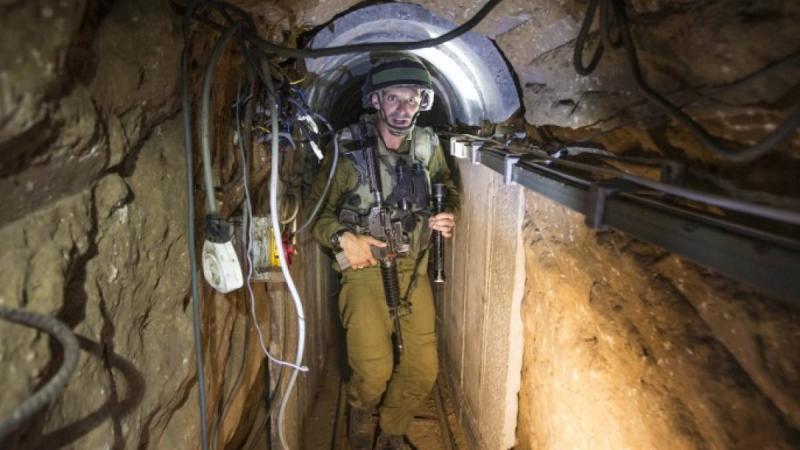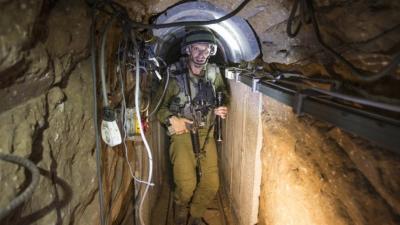"Good idea, but I won’t comment on the details," is how Israeli military chief Herzi Halevi responded to a question about reports of a plan to flood Hamas' tunnel network in Gaza, raising questions about its practical implementation amid warnings of environmental risks that would persist for decades. A report from the Wall Street Journal noted that Israeli officials informed the U.S. that the Israel Defense Forces had installed five large water pumps near the Beach refugee camp in Gaza last month, capable of flooding the tunnels within weeks by pumping thousands of cubic meters of water every hour. Officials stated that Israel briefed the U.S. on the plan last month, but had not yet decided whether to execute it. However, Israel unexpectedly announced that it had already started pumping water into the tunnels.
Former Israeli intelligence officer and strategic security expert Avi Melamed confirmed that "implementing the idea of flooding the tunnels is very possible if the army has exhausted other options." Avi is unsure "if the idea can be technically applied given the large tunnel network built by Hamas underground, but surely, engineering experts are working on applying the best and least harmful ideas for the environment."
Former Egyptian intelligence officer and strategic expert Mohamed Abdel Wahid stated that promoting this idea falls under the category of "psychological warfare," but it is not impossible practically, as Egypt applied it by flooding the tunnels between North Sinai and Gaza a few years ago due to their use by smugglers and terrorists. Abdel Wahid noted, "Egypt flooded the tunnels with seawater in hours, not days, but the difference is that we had knowledge and maps of all the tunnels, unlike Israel." He clarified that Israel’s crisis lies in its inability to identify the tunnel maps and that it had not discovered the majority of them. Recently, the Israeli military stated that its forces discovered "more than 800 tunnels" belonging to Hamas in Gaza and added that they had destroyed 500 of them.
"Extremely Complex"
Abdel Wahid believes that "the tunnels in Gaza are an extremely complex issue and were designed in a way that Israel and its partners have not discovered yet, as evidenced by the fact that the best British planes intervened days ago following American planes to search for the tunnels where hostages are located." The Israeli military refers to the tunnels built by Hamas over the past fifteen years or so as the "Gaza Metro." The tunnels form a vast network used for storing rockets and munitions, as well as providing militants a means to move unnoticed. The military claims these tunnels contain vital command and control centers for Hamas.
However, Abdel Wahid considered that promoting the idea of "flooding the tunnels" falls into the realm of "psychological warfare and destroying the morale of the Palestinian people to end any hopes for their future."
"Environmental Risks"
According to the Times of Israel, environmental experts warned the army against flooding the tunnels with seawater "due to serious negative environmental impacts that will last for generations." Under normal conditions, rain falls to the ground and spreads to underground storage areas or aquifers. These groundwater supplies are pumped to wells for drinking water.
Over two million people live in Gaza, making it one of the most densely populated places on earth. Most fresh water sources in the territory come from shallow groundwater. In recent years, groundwater levels have significantly dropped, allowing seawater to intrude into the aquifer and mix with some of the remaining fresh water, to the extent that 97 percent of fresh water in Gaza no longer meets the quality standards set by the World Health Organization, according to the newspaper. Even before the war, most of the population in Gaza relied on private water tankers and small desalination plants for drinking water.
In the aftermath of Hamas's attack on Israel on October 7, which led to the deaths of approximately 1,200 people and the abduction of 240 others by Hamas, classified as a terrorist organization in the U.S. and other countries, Israel shut off three pipelines carrying drinking water to the territory. Under U.S. pressure, it reopened two of them. Nevertheless, the residents of Gaza continue to suffer from a severe shortage of clean water.
The newspaper quoted Elan Adar, an expert at the Zuckerberg Institute for Water Research at Ben Gurion University in Israel, stating that if several million cubic meters are pumped into the tunnels and seep into the aquifer, the "negative impact on groundwater quality will last for several generations, depending on the quantity that seeps into the ground," noting that Israel would not be affected, as coastal groundwater flows from Israel to Gaza, not the other way around. He added, "As an Israeli citizen, despite the catastrophe we endured on October 7, I still believe that in the long term, as we think about the future, it would be politically and morally wrong for us to have a thirsty neighbor."




